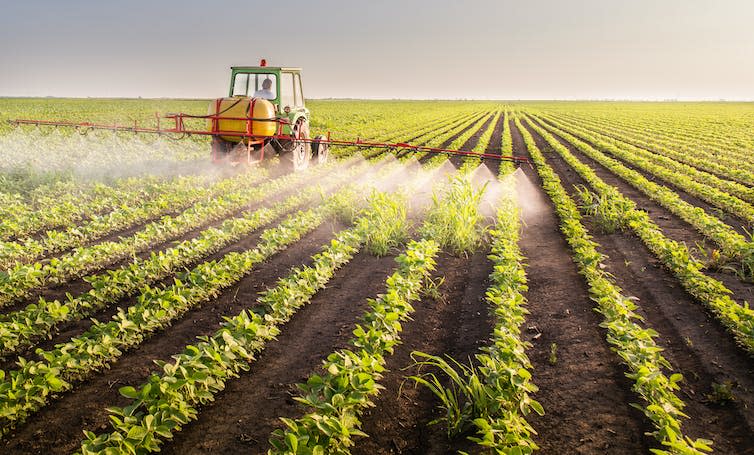The European Commission launched a proposal in July 2023 to deregulate large numbers of plants manufactured using new genetic techniques.
Despite extraordinary efforts by the Spanish presidency to make progress, EU members have not yet reached a consensus on this plan. But if the proposal is approved, those plants would be treated the same as normal plants, eliminating the need for safety tests and labeling of genetically modified food products.
The European public has refused to blindly accept genetically modified food from the moment the technology was developed, mainly due to concerns about corporate control, health and the environment.
Biotech firms have been trying to sell genetically modified crops to Europeans for years. But most European citizens are convinced that crops made with both old and new genetic techniques should be tested and labelled.
So where did this proposal come from? Biotech firms seem to have succeeded in convincing the European Commission that we need a new genetically modified crop to combat climate change. They argue that by improving crops’ resistance to drought or improving their ability to capture carbon, climate change may no longer seem such a daunting challenge.
If this seems too good to be true, unfortunately, it is. Biotech firms have taken advantage of growing concerns about climate change to influence the European Commission with a lobbying campaign to be organised.

Climate goals as a PR strategy
In 2018, the European Court ruled that plants made with new genetic techniques must be regulated like any other genetically modified organism. Biotech firms and their allies within biotech research centers plan to convince the European Commission that entirely new legislation is needed.
The first step was to rebrand the techniques they are using, aiming to distance themselves from the bad reputation of genetic modification. Biotech firms started using more innocent terms like gene editing and precision breeding instead.
They then argued that there is no difference between their processes and what occurs in nature, presenting them as a superior version of natural processes. Biotech firms want this argument to end the labeling requirement, which acts as a barrier to selling their products in a climate of public disapproval.
Thirdly, they have invoked the urgency of the climate crisis to argue that we cannot afford time-consuming safety tests. They argued that such tests would stifle innovation in a time of accelerating climate change.
There are several flaws in this approach. The terms “gene editing” or “precision breeding” might be more reassuring, but we argue that they are essentially marketing terms and say nothing about the accuracy of the techniques used or the potential negative effects. at them.
Studies have shown that new genetic techniques can change the characteristics of a species “to a degree that would be impossible, or at least highly unlikely, using traditional breeding”. They can also induce significant unintended changes in plant genetic material.
But, perhaps more importantly, genetically modified plants are not the solution to the climate crisis. They are a false solution that starts from the wrong question.
False promises
It is well known that our current agricultural model contributes significantly to climate change. The development of genetically modified crops is largely driven by the same agrochemical giants that founded and control this form of agriculture.
Companies like Corteva and Bayer (acquired by US agrochemical company Monsanto in 2018) are leading the race to obtain patents on new genetic techniques and their products.
Typical examples include patents for soybeans with increased protein content, waxy corn, or herbicide-tolerant rice. These crops are designed for an agricultural model focused on the large-scale cultivation of individual crop varieties destined for the global market.
This agricultural model relies on huge amounts of fuel to distribute and makes farmers dependent on heavy machinery and farm inputs (such as artificial fertilizers and pesticides) derived from fossil fuels.
Research has shown that farming in this way leads to soil depletion and loss of biodiversity. It also increases vulnerability to pests and disease, requiring the development of different and potentially more toxic pesticides and herbicides.
Although biotech firms are playing the climate card, only a small proportion of the genetically modified crops being developed address climate concerns. Indeed, the climate credentials of many of these crops are questionable. There are only modifications such as increased shelf life, or being able to stand up better to being transported, to streamline the operation of our unsustainable food system.
Instead of reinforcing our unsustainable agricultural model, the focus should be on restoring what industrial agriculture has destroyed: farmers’ livelihoods, biodiversity and soil health. Only then will farmers be able to cultivate local climates that naturally store carbon and provide the best conditions for food production without putting so much pressure on the environment.


Pay the price
Biotech firms support a no-test policy, arguing that new genetically modified crops would be safe. But there is a problem. The legislation proposed by the European Commission eliminates the possibility of finding out whether these claims are correct.
Health and environmental problems are often the result of complex, interacting and largely invisible causes. As tracking and labeling will not be mandatory, it will be very difficult to trace any adverse outcomes back to their causes.
Ultimately, people and the planet will pay the price when untested genetically modified crops enter our environments and the food chain.
In response to this article, a spokesperson from the American Seed Trade Association said that plant breeders need all the tools available to provide farmers with improved plant varieties so they can continue to produce in a challenging environment. The Association said there is a consensus among plant breeders and regulatory bodies that innovative techniques, such as genome editing, can be safely integrated into breeding programs. Bayer and Corteva were contacted for comment on the issues raised in this article, but had not provided any by the time of publication.
This article from The Conversation is republished under a Creative Commons license. Read the original article.


The authors do not work for, consult with, or own shares in, or receive funding from, any company or organization that would benefit from this article, and have disclosed no relevant affiliations beyond their academic appointment.